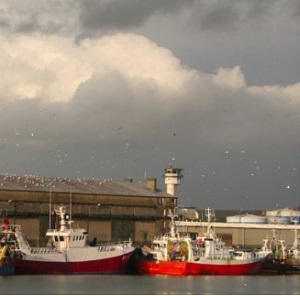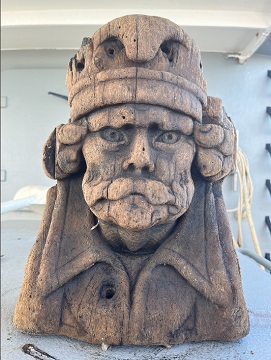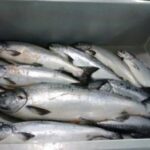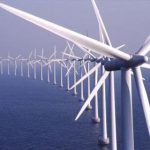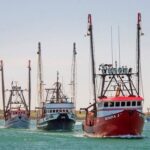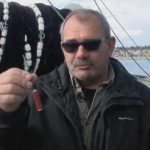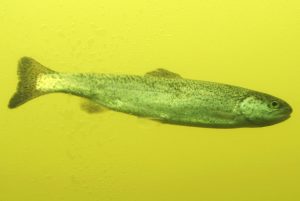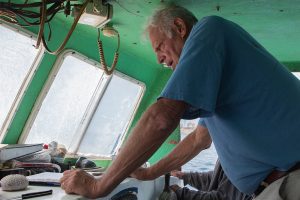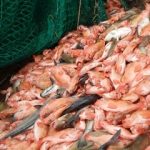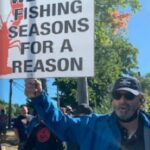Tag Archives: Netherlands
Vessel Review – Janneke – Versatile beamer/twin-rigger delivered to Dutch owner
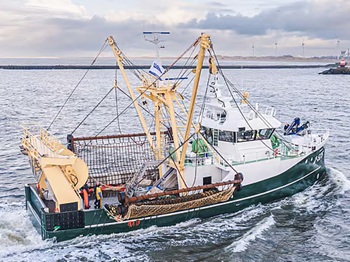 Urk, Netherlands-based Werft Shipbuilding recently delivered a new trawler to local fisherman and skipper Jelle Hakvoort. Named Janneke after Hakvoort’s daughter, the Bureau Veritas-classed newbuild was designed by Dutch naval architecture firm Marimecs as a multi-functional vessel. The summer months will see it using twin-rig gear whereas beam gear will be employed during winter. Targeted species include squid, scallops, sole, langoustine, plaice, and turbot. Janneke has been registered to Belgium and will be operated out of Zeebrugge. This is because the owner believes that operating under the Belgian flag ensures that the vessel has access to a greater number of fishing grounds in areas such as the North Sea, the English Channel, the Irish Sea, and the Bay of Biscay. Photos, Specifications, more, >>CLICK TO READ<< 09:028
Urk, Netherlands-based Werft Shipbuilding recently delivered a new trawler to local fisherman and skipper Jelle Hakvoort. Named Janneke after Hakvoort’s daughter, the Bureau Veritas-classed newbuild was designed by Dutch naval architecture firm Marimecs as a multi-functional vessel. The summer months will see it using twin-rig gear whereas beam gear will be employed during winter. Targeted species include squid, scallops, sole, langoustine, plaice, and turbot. Janneke has been registered to Belgium and will be operated out of Zeebrugge. This is because the owner believes that operating under the Belgian flag ensures that the vessel has access to a greater number of fishing grounds in areas such as the North Sea, the English Channel, the Irish Sea, and the Bay of Biscay. Photos, Specifications, more, >>CLICK TO READ<< 09:028

New trawler built in Urk
There was no doubt in Urk fisherman Jelle Hakvoort’s mind that he wanted to build his new trawler close to home. Urk co-operative VCU played a significant role in the construction of new multi-purpose fishing vessel Janneke Z-575, which has begun fishing with beam trawl gear. Urk company Werft Shipbuilding is the designer and has been the main contractor throughout – while VCU’s Albert Hartman has also been closely involved with the construction even before the order had been placed. Photos, more, >>CLICK TO READ<< 07:46
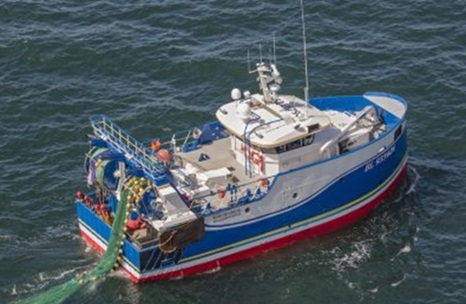
Tensions flare as Channel seiners clash
The crew of UK-flagged, Urk-owned seine netter F/V Henk Senior are accused of hostile actions towards Boulogne seiner F/V Rose de Cascia in an incident that Xavier Bertrand describes as being ‘of exceptional gravity’ and as crossing a ‘critical threshold.’ Reports are that the 30-metre Henk Senior’s crew grappled the 19-metre Rose de Cascia’s seine rope, hauling the French vessel backwards before the seine rope parted. Rose de Cascia was able to retrieve its gear. He states that this goes significantly further than the usual problems of co-operation between fishermen in the wake of Brexit, and that this incident is an example of ‘the tensions in the Pas-de-Calais region since Brexit and the reduction in fishing areas.’ more, >>CLICK TO READ<< 07:31
Ready for the future
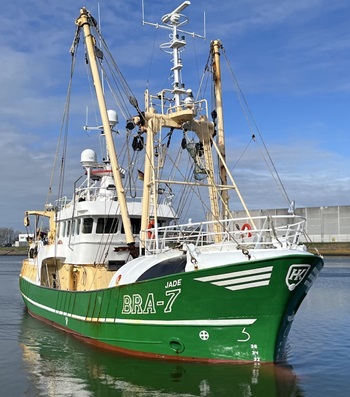 Den Helder fisherman and industry activist Dirk Kraak remains optimistic for optimistic. The family business recently had one of its vessels, HD-66, completely refitted to meet the latest demands. ‘We can now go forward for at least another ten years,’ he said. Both his grandfathers fished for shrimp and herring, his father for flatfish. So for third-generation fisherman Dirk, a future in fishing was the obvious choice. At sixteen he joined Jac Bakker en zonen, fishing on Ennie en Appie HD-24, as he wanted to gain experience outside the family business. ‘We fished with a beam trawler for sole and plaice in the German Bight. I learned a lot there. I still use that knowledge today.’ Photos, 2 parts, more, >>CLICK TO READ<< 16:55
Den Helder fisherman and industry activist Dirk Kraak remains optimistic for optimistic. The family business recently had one of its vessels, HD-66, completely refitted to meet the latest demands. ‘We can now go forward for at least another ten years,’ he said. Both his grandfathers fished for shrimp and herring, his father for flatfish. So for third-generation fisherman Dirk, a future in fishing was the obvious choice. At sixteen he joined Jac Bakker en zonen, fishing on Ennie en Appie HD-24, as he wanted to gain experience outside the family business. ‘We fished with a beam trawler for sole and plaice in the German Bight. I learned a lot there. I still use that knowledge today.’ Photos, 2 parts, more, >>CLICK TO READ<< 16:55
Taking action on lobster stock fluctuation
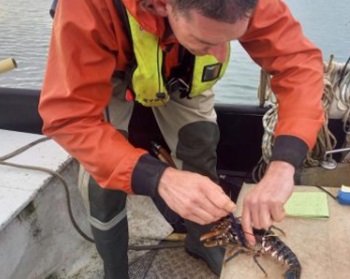 There’s increasing concern about unexplained structural decline of European lobster in the Netherlands’ Eastern Scheldt lobster fishery. Accurate stock assessment is essential for understanding these declines and implementing sustainable management, but scientific knowledge on lobster stocks in the Netherlands is lacking. Seeing a need for action, the Association of Professional Fishers Oosterschelde, Westschelde and Voordelta (OWV) developed a fishing plan to improve regional fisheries management, seeking to engage with the government and stakeholders to develop science-based fishery management strategies. more, >>CLICK TO READ<< 08:20
There’s increasing concern about unexplained structural decline of European lobster in the Netherlands’ Eastern Scheldt lobster fishery. Accurate stock assessment is essential for understanding these declines and implementing sustainable management, but scientific knowledge on lobster stocks in the Netherlands is lacking. Seeing a need for action, the Association of Professional Fishers Oosterschelde, Westschelde and Voordelta (OWV) developed a fishing plan to improve regional fisheries management, seeking to engage with the government and stakeholders to develop science-based fishery management strategies. more, >>CLICK TO READ<< 08:20
Shrimp fisherman gets back earring lost at sea 23 years ago
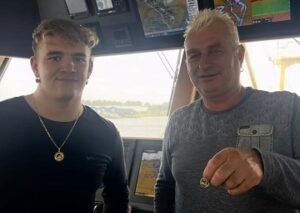 Shrimp fisherman Henk Kuiper has been reunited with an earring he lost at sea some 23 years ago, when it turned up on board another trawler, Dutch media reported on Friday. The earring features a silhouette of the trawler WR70 which actually sank some 36 years ago off the coast of Tereschelling and was of great sentimental value to Kuiper. He was on board at the time. “I was busy hosing down the decks when we were finished fishing and then I saw it stuck on the rubber edging,” trainee fisherman Noah Schroevers told the paper. “We took photos and put them online.” >click to read< 08:01
Shrimp fisherman Henk Kuiper has been reunited with an earring he lost at sea some 23 years ago, when it turned up on board another trawler, Dutch media reported on Friday. The earring features a silhouette of the trawler WR70 which actually sank some 36 years ago off the coast of Tereschelling and was of great sentimental value to Kuiper. He was on board at the time. “I was busy hosing down the decks when we were finished fishing and then I saw it stuck on the rubber edging,” trainee fisherman Noah Schroevers told the paper. “We took photos and put them online.” >click to read< 08:01
Werft wins new build project for multifunctional fishing vessel
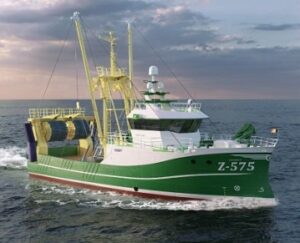 The Flemish trawler will be named Janneke after the daughter of the captain/owner Jelle Hakvoort and be 27.99 metres long with a beam of 8.25 metres. Hakvoort himself is delighted with the design. “It is ideal for beam rawling in the winter months, and twin rigging in the summer; either for plaice or crustaceans.” Hakvoort has spent his career to date fishing on Eurocutters, known as the smaller segment in Belgium, and is now switching to a larger segment: “I have complete faith in Werft and its experienced partners,” he adds. >click to read< 08:26
The Flemish trawler will be named Janneke after the daughter of the captain/owner Jelle Hakvoort and be 27.99 metres long with a beam of 8.25 metres. Hakvoort himself is delighted with the design. “It is ideal for beam rawling in the winter months, and twin rigging in the summer; either for plaice or crustaceans.” Hakvoort has spent his career to date fishing on Eurocutters, known as the smaller segment in Belgium, and is now switching to a larger segment: “I have complete faith in Werft and its experienced partners,” he adds. >click to read< 08:26
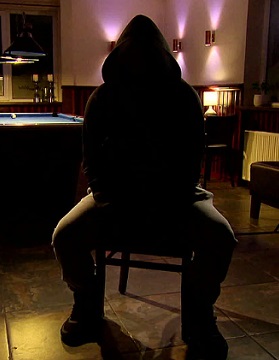
Dutch beam trawlers smuggle cocaine in Danish waters
Poor and non-existent controls in ports such as Hanstholm and Thyborøn give international drug cartels good opportunities to smuggle in Danish waters. At the West Jutland ports, there are stories that one of the locals has been threatened with death in Thyborøn, and that at least three others have been beaten down by the so-called “pirates” in Hanstholm. No one wants to get their name out because they fear reprisals. Someone knows little. Others almost nothing. A Dutch fisherman has agreed to meet, despite the fact that, by his own admission, he risks his life. As we sit down, the fisherman makes it clear that he will in no way be recognizable: “I have to be 100 percent sure. Otherwise, I’m dead. They are ‘crazy’. He emphasizes that not all beam trawlers smuggle drugs, but several of them. The smuggling takes place when the beam trawler far out in the North Sea, where no one sees them, meets a large container ship, typically with fruit from South America. Photos, Videos, >click to read< 16:20
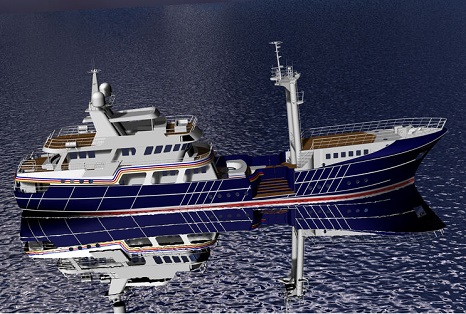
The unlikely conversion of the 45m trawler Scintilla Maris
A single-prop fishing trawler is not an obvious choice for conversion into a superyacht, but for the owner of Scintilla Maris it was the only one. We travelled to the Damen Maaskant shipyard near Rotterdam to find out more. Entrepreneur Erik Vonk grew up fascinated by tugboats and trawlers. “In the 1980s and into the ‘90s these steel-hulled boats represented the epitomy of Dutch shipbuilding,” says Vonk. “They were very sturdily built, almost over-engineered, to deal with conditions in the North Sea. I’d been following the Dutch beam trawlers for years and when one became available as part of a decommissioning scheme in 2006 I decided to buy her, basically with a virtual handshake over the phone.” lots of photos, >click to read< 15:32
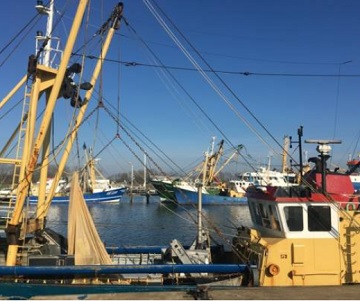
Shrimp industry is under threat, fishermen tell the king
A group of North Sea fishermen have urged king Willem-Alexander to step in and help the Dutch fishing industry which they say is being threatened by government and EU policy. In total, 400 skippers and fishing industry companies signed the letter as well as 45 Belgian and German trawler operators who fish in Dutch waters. The fishermen are particularly concerned about new emissions targets for trawlers operating in Natura 2000 areas. The new motors which trawlers need to meet the targets by October 1 cost some €100,000 and only half of that can be covered by government subsidies, they say. >click to read< 12:47
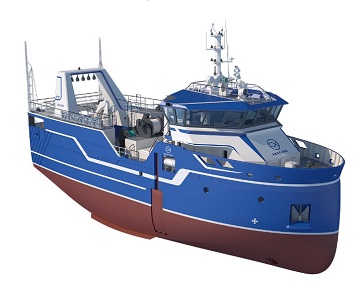
Sanford Goes for Green with Maaskant Order
New Zealand seafood company Sanford Limited has placed an order with Damen Shipbuilding Maaskant for the design and build of a new scampi vessel for operation in the Southern Ocean. This new vessel is expected to contribute to Sanford’s target of reducing the carbon footprint from its direct operations by 25% between 2020 and 2030. The construction of the diesel-electric vessel will take place at the Damen Maaskant yard in the Netherlands, with a delivery date in 2025. Images, >click to read< 20:29
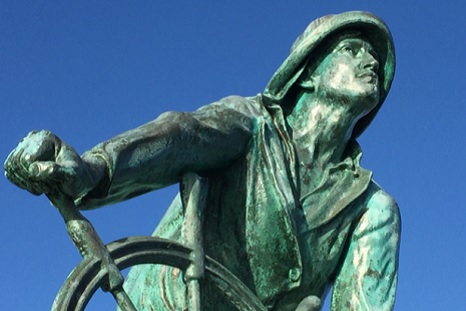
NOAA – A Failed Agency
The Magnuson Act became the law of the land in 1977. Seven years later, the 200-mile limit between Canada and the United States was decided at the world court in the Hague, Netherlands. Both had good intentions, however both failed. Magnuson was supposed to keep fish stocks at a sustainable level and keep maritime communities, like Gloucester prosperous. It made sense. Plenty of fish meant plenty of fishing, processing and a strong waterfront economy. After NOAA Magnuson was signed into law and kicked out the foreign vessels, they contradicted their own intentions of “overfishing” and built up the American fleet by offering government-backed low interest loans. This set off a frenzy of boat building at a time when fish stocks were plentiful. The fleet doubled in size in less than a decade. This offset the gains made from keeping foreign vessels out. Well, it backfired. While we like to think that the foreign fleets raped our fish stocks, it was really NOAA’s’ misguided encouragement and failed policies. “Go get’em boys, it’s all ours now” was their signal to fishermen. >click to continue<, By Sam Parisi. Gloucester, Mass. 18:32
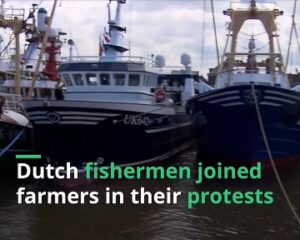
Dutch farmers and fishermen block roads and port to protest new emissions rules
At the heart of the protest are targets introduced last month to halve harmful nitrogen compounds by 2030. It is the latest attempt to tackle a problem that has plagued the country for years. Dutch fishermen have joined farmers in protesting nitrogen emission targets. In Harlingen, they blocked the port with trawlers meaning ferries to the islands of Terschelling and Vlieland could not leave for hours. Shrimp fishermen in particular fear that they will run into problems due to the government’s emission targets. As of next year, they will need to apply for new fishing permits. Without the necessary adjustments to their trawlers, the permits could be withheld. It would mean they would no longer be allowed to do their jobs., Video, >click to read/watch< 16:51 An aside. Human sewage can introduce disease-causing pathogens and nitrogen into the ocean, potentially impacting human health as well as coastal ecosystems and the communities that depend on them for such purposes as fishing. Interesting facts, and graphics. >click to read<
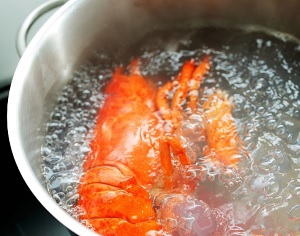
Netherlands to ban live boiling of lobsters, crabs
Minister Carola Schouten of Agriculture wants to ban the live boiling of lobsters and crabs. She will also look into what can be done in the Netherlands to ensure that the animals are not cooked alive.,, This follows a recent study commissioned by the British government that found strong scientific evidence that crabs, lobsters, and octopuses can suffer and experience pain. Britain, therefore, added them to the animal protection legislation. Animal welfare organizations want the Netherlands to do the same. >click to read< 11:38
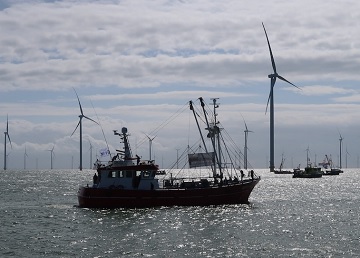
Due to current expansion, the Dutch fleet faces loss of fishing grounds to offshore wind farms
The number of windmills in Dutch waters is set to increase rapidly, not only in the North Sea, but also in the fresh waters of the IJsselmeer where a fleet of small fishing boats catches eel, perch, pike perch and roach. In a demonstration of their anger and frustration, last month fishermen took their protests against the energy sector to a gathering off the coast along Breezanddijk. This is a remote location in the middle of the huge Afsluitdijk, but close to a huge wind mill park. About sixty fishing vessels gathered for the demonstration. Wind farms have been taking over productive fishing grounds for several years now,,, photo’s, >click to read< 12:55
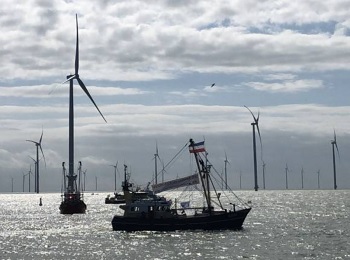
Fleet of more than 50 fishing cutters protesting in Afsluitdijk against offshore wind farms
“We want to keep fishing,” says Anja Keuter, a spokeswoman for IJsselmeer fishermen in the Netherlands. Her husband is a fisherman and her three sons want to be one too. Today sailing on one of the cutters. “So many areas have been closed to fishing by wind farms that we won’t have any more space soon. Both in the North Sea and in the IJsselmeer.” In the part of the IJsselmeer where the protest takes place today, near Breezanddijk, fishing cutters are no longer welcome. The Fryslân wind farm can be seen from the dam. Recently there are 89 windmills in the water. >click to read< 12:42
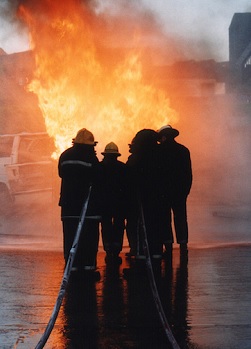
SAFETY: A gradual culture change has been taking place across much of the fishing industry
As one of the world’s leading insurers of fishing vessels, Sunderland Marine keeps a close eye on the fishing industry’s evolution and has encouraged increasing safety awareness. Sunderland Marine has taken the initiative where it has seen that improvements can be made,,, This is not just in the UK, but also through initiatives in Australia and New Zealand, both of which have also seen a safety culture developing in the right direction In the US, Sunderland Marine has also been instrumental in making available independent safety drills for crews working on East Coast draggers and scallopers. In addition, the offshore crab fishery that’s familiar to anyone who has seen the Deadliest Catch on TV has seen positive changes. photos, >click to read< 17:32
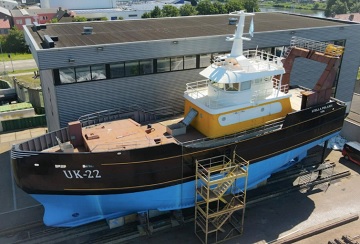
Half a Metre Longer, and as Good as New
Seine netter Stella Polaris UK-22 has been through a major refit when owner Pauw Romkes acquired the boat, and fifteen years on the decision was taken to embark on another extensive refit. The refit has been a drastic one, removing and replacing everything above the waterline. The hull was split into on the slipway at the Balk Shipyard, where a new 2.50 metre middle section was inserted, but with the way that the bow section has been remodelled, UK-22’s overall length of 30.50 metres is only 50cm longer than it had been before. photos, >click to read< 16:55
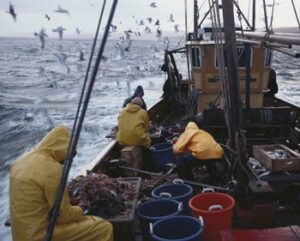
Will Britain lose another fishing war?
On average, a fish in the North Sea crosses five territorial waters frontiers every day. They don’t have passports or face quarantine. Britain made a fool of itself during the three cod wars it fought with Iceland between 1956 and 1976. British fishermen decided these were “traditional” waters and the Royal Navy was sent in to try and intimidate the Icelandic fishing boats. Other than geo-thermal energy, banking and airlines, the main Icelandic product is cod. They depended on hauling cod of out the northern waters close to Arctic Circle — we looked absurd trying to stop them. Does a new fish war with France, the Netherlands, and Spain now loom? The problem arises partly from the 1982 UN Law of the Sea convention which extended territorial waters out to 200 km. >click to read< 10:09
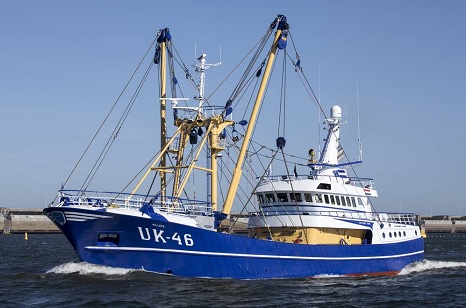
New Beam Trawler Delivered
Over the last 10 months, Damen Maaskant Shipyards Stellendam (Maaskant) has outfitted the 41-meter hull from stock. The vessel, designated UK 46, is for Hakvoort Brothers, based in Urk, the Netherlands. According to the builder, a key feature of the vessel is the installation of twin Optima nozzles manufactured by Damen Marine Components (DMC). This is the first time that Maaskant has installed these in a fishing boat. >click to read<12:49
U.K. to End Half Century of Fishing Rights in Brexit Slap to EU
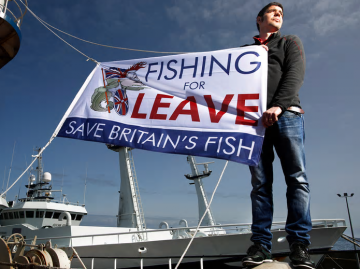 Prime Minister Theresa May will pull Britain out of the 1964 London convention that allows European fishing vessels to access waters as close as six to twelve nautical miles from the U.K. coastline. Britain’s withdrawal from the European Union was already going to stop fishing by European boats within 12 to 200 nautical miles (22 to 370 kilometers) of British shores, but this move goes even further in terminating historic rights enjoyed by France, Belgium, Germany, Ireland, Netherlands that predate the U.K.’s own entry into the EU. “For the first time in more than fifty years we will be able to decide who can access our waters,”,,, click here to read the story 19:34
Prime Minister Theresa May will pull Britain out of the 1964 London convention that allows European fishing vessels to access waters as close as six to twelve nautical miles from the U.K. coastline. Britain’s withdrawal from the European Union was already going to stop fishing by European boats within 12 to 200 nautical miles (22 to 370 kilometers) of British shores, but this move goes even further in terminating historic rights enjoyed by France, Belgium, Germany, Ireland, Netherlands that predate the U.K.’s own entry into the EU. “For the first time in more than fifty years we will be able to decide who can access our waters,”,,, click here to read the story 19:34






